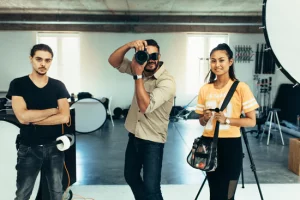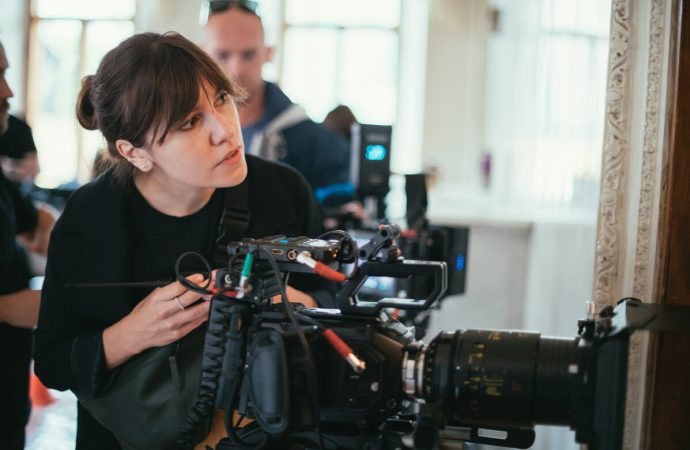Introduction Creative jobs in entertainment have traditionally been the domain of human ingenuity, requiring a unique blend of talent, intuition, and experience. However, the advent of AI technologies has introduced new dynamics, altering how these jobs are performed and perceived. As AI continues to evolve, it brings forth a paradigm shift that promises to reshape
Introduction
Creative jobs in entertainment have traditionally been the domain of human ingenuity, requiring a unique blend of talent, intuition, and experience. However, the advent of AI technologies has introduced new dynamics, altering how these jobs are performed and perceived. As AI continues to evolve, it brings forth a paradigm shift that promises to reshape the landscape of entertainment.
AI in Scriptwriting and Storytelling

Image by: Google.com
One of the most intriguing applications of AI in creative jobs in entertainment is in scriptwriting and storytelling. AI algorithms can analyze vast amounts of data to identify successful plot structures, character arcs, and dialogue patterns. Tools like OpenAI’s GPT-3 can generate scripts or suggest plot twists, offering writers a new set of tools to enhance their creativity.
However, the integration of AI in scriptwriting raises questions about originality and authenticity. While AI can assist in generating ideas, the human touch remains irreplaceable for crafting stories that resonate on an emotional level. AI can provide a foundation, but it is the human writer who breathes life into the narrative.
Visual Effects and Animation

Image by: Google.com
In the realm of visual effects (VFX) and animation, AI has proven to be a game-changer. Machine learning algorithms can automate labor-intensive tasks such as rotoscoping, compositing, and even rendering. This not only speeds up the production process but also reduces costs, allowing for more ambitious projects.
Moreover, AI-driven tools like Deep Motion and NVIDIA’s GANs (Generative Adversarial Networks) are enabling more realistic animations and character movements. These advancements are particularly beneficial for smaller studios that may not have the resources for extensive VFX work.
Despite these advantages, there is a concern that AI could lead to job displacement. While AI can handle repetitive tasks, the creative vision and expertise of human artists are still crucial for producing high-quality content. The challenge lies in finding a balance where AI complements rather than replaces human creativity.
Music Composition and Sound Design

Image by: Google.com
AI’s impact on music composition and sound design is another area worth exploring. Algorithms like AIVA (Artificial Intelligence Virtual Artist) can compose music in various styles, from classical to contemporary. These AI composers can generate background scores for films, TV shows, and video games, providing a valuable resource for creators.
In sound design, AI tools can analyze audio data to create realistic soundscapes and effects. This capability is particularly useful in post-production, where time and accuracy are of the essence. However, the role of a human sound designer remains indispensable for adding nuance and emotional depth to the audio experience.
Gaming and Interactive Media

Image by: Google.com
The gaming industry has been quick to adopt AI technologies, leveraging them to create more immersive and interactive experiences. AI-driven NPCs (Non-Player Characters) can adapt to player behavior, offering a more dynamic and engaging gameplay experience. Procedural content generation, powered by AI, allows for the creation of vast, intricate game worlds that would be impossible to design manually.
For game designers and developers, AI offers new tools to streamline the creative process. However, it also introduces complexities in terms of ethical considerations and player data privacy. As AI continues to evolve, the industry must navigate these challenges to ensure a balanced and fair gaming experience.
Ethical Considerations and Future Prospects

Image by: Google.com
The integration of AI in creative jobs in entertainment is not without ethical considerations. Issues such as data privacy, algorithmic bias, and the potential for job displacement need to be addressed. As AI becomes more prevalent, it is essential to establish guidelines and regulations that ensure its responsible use.
Looking ahead, the future of AI in creative jobs in entertainment appears promising. With ongoing advancements in machine learning, natural language processing, and computer vision, AI will continue to provide valuable tools for creators. The key lies in fostering a collaborative environment where AI and human creativity coexist, enhancing each other’s strengths.
The Future of Creative Jobs in an AI-Driven Entertainment Industry

Image by: Google.com
- New Opportunities and Hybrid Roles
Despite the challenges, the integration of AI into the entertainment industry also presents new opportunities for creative professionals. As AI tools become more advanced, they are likely to create demand for new types of jobs that bridge the gap between technology and creativity. For example, roles such as AI content curators, data-driven creative strategists, and AI ethics consultants could emerge as essential positions within the industry.
Moreover, the collaboration between humans and AI is likely to result in the development of hybrid creative roles. Professionals who can combine traditional creative skills with an understanding of AI technology will be in high demand, as they will be uniquely positioned to leverage AI’s capabilities to enhance storytelling, design, and production.
- Embracing Innovation While Preserving Creativity
As AI continues to evolve, the entertainment industry will need to find a balance between embracing technological innovation and preserving the core elements of human creativity. While AI can enhance efficiency and open up new possibilities for content creation, the heart of entertainment lies in the ability to connect with audiences on an emotional level a quality that is inherently human.
By fostering collaboration between AI and human creators, the industry can harness the best of both worlds, using AI to streamline processes and generate new ideas, while ensuring that the creative spirit remains at the forefront of entertainment. As the industry navigates this transition, ongoing dialogue and thoughtful consideration of the ethical implications will be crucial in shaping a future where AI and creativity coexist harmoniously.
Conclusion
The impact of AI on creative jobs in entertainment is profound and multifaceted. While AI offers numerous benefits, from automating repetitive tasks to generating new creative ideas, it also presents challenges that need careful consideration. By embracing AI as a complementary tool, rather than a replacement, the entertainment industry can unlock new possibilities and continue to thrive in the digital age.
In summary, the integration of AI in creative jobs in entertainment is a double-edged sword. It offers exciting opportunities for innovation and efficiency, but it also requires a thoughtful approach to ensure that the essence of human creativity remains at the forefront. As we move forward, the synergy between AI and human ingenuity will shape the future of entertainment, creating experiences that are richer, more immersive, and more captivating than ever before.
















